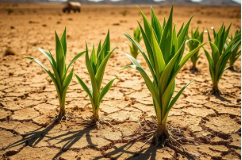
The latest report from the Food and Agriculture Organization (FAO) of the United Nations indicates a promising decline in global hunger, signaling progress in the fight against food insecurity. According to the report, approximately 8.2% of the world population, or over 650 million people, were affected by hunger in 2024, down from 8.7% in 2022.
This reduction reflects sustained efforts by governments, international organizations, and local communities to improve access to nutritious food, enhance agricultural productivity, and strengthen social safety nets. Initiatives ranging from improved crop production to targeted food assistance programs have contributed to this gradual but meaningful progress.
Regional trends show that while some areas continue to face severe challenges, others have made notable improvements. Sub-Saharan Africa, South Asia, and parts of Latin America remain the most affected regions, but targeted interventions and international support have helped mitigate the severity of food insecurity. Enhanced infrastructure, better storage facilities, and the adoption of modern farming techniques have also contributed to more stable food supplies.
The FAO report highlights the importance of addressing the root causes of hunger, including poverty, inequality, climate change, and conflicts that disrupt food systems. Experts emphasize that sustained investment in resilient agriculture, rural development, and nutrition-sensitive policies is essential to maintain the downward trend in global hunger.
Technological innovations and sustainable farming practices are playing an increasingly important role. Precision agriculture, climate-resilient crops, and community-based nutrition programs are helping farmers increase productivity while ensuring that vulnerable populations have access to sufficient and nutritious food.
Despite the positive trend, the FAO cautions that global hunger remains a pressing challenge, with millions of people still facing food insecurity. Continued global cooperation, policy support, and investment in sustainable agriculture are critical to achieving the United Nations Sustainable Development Goal of zero hunger by 2030.
The decline in global hunger offers hope and demonstrates that coordinated action and innovation can make a tangible difference. As nations continue to implement effective food security strategies, the world moves closer to a future where access to safe, nutritious, and sufficient food is a reality for all.














